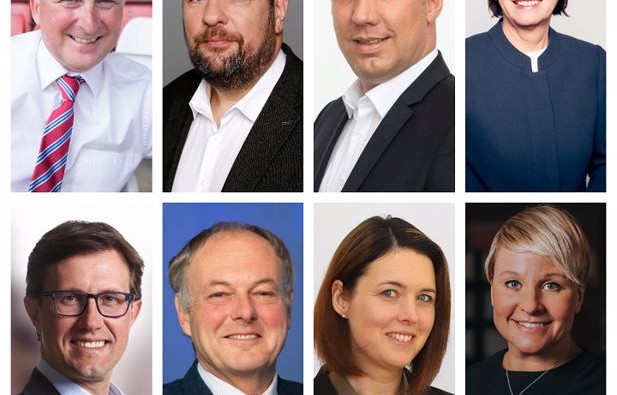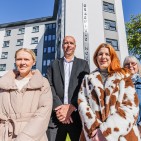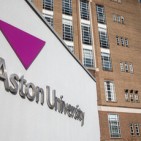Civic Leaders from cities across Europe came together online for the first ‘EUniWell Mayors’ Meeting’.
The event united leaders from the home cities of the seven universities which form the European University for Well-Being (EUniWell). It gave them the opportunity to meet each other, learn more about the alliance and develop first ideas for cooperation.
Each of the city leaders set out their cities’ and citizens’ well-being challenges and made suggestions how regional governments could work effectively with the pan-European partnership to deliver education, training and skills development that benefit people in the seven cities and beyond.
EUniWell brings together universities from seven European countries and has more than 100 associate partners which cover the regions’ health, education and business sectors. The partnership aims to generate research and new knowledge on well-being, shape policy and provide skills development opportunities that will enhance European citizens’ quality of life.
Speaking on behalf of EUniWell, University of Birmingham Pro-Vice-Chancellor (International) Professor Robin Mason commented: “In bringing together civic leaders from across our home cities, we have the opportunity to understand the well-being priorities of the communities in which we are located.
“As an alliance with a strong civic remit, we are exploring well-being in all of its forms from individual quality of life to social cohesion and environmental balance. Given that we are responsible for educating the future workforce, we aim to work with local and regional leaders in supporting societal well-being through research and education.”
Discussing the future with EUniWell leaders, the group agreed to develop adaptable solutions and exchange best practices around social issues such as housing and green capital – bridging the gap between research and the practical problems cities are facing.
Despite regional variations, COVID-19 presents all of the university cities with the same challenge: how to reconfigure citizens’ sense of belonging when physical engagement with place is constrained. There are clear opportunities for our cities and their universities to work together to redefine community and identification with our city regions and ensure we build back better. Developing new, post-COVID concepts of what connects a city and its university in the digital age will boost the impact this has on citizens.
Beatrix Busse, Chief Development Officer of EUniWell, commented: “Cities are becoming smarter, whilst our world is marked by increased polarisation, populism and misinformation leading to various forms of social inequality. We want to work with our cities on creating a long-lasting cooperation around well-being issues.”
Amel Anane, EUniWell’s Chief Student Officer, said: “It is our hope and our conviction that EUniWell will provide the infrastructure for students to become engaged in civic activities that will enhance the well-being of citizens across our network of partners.”
The universities’ alliance connects with its cities and regions in a number of ways, for example:
• The Well-Being Impact Framework Study – evaluating EUniWell’s economic, social, cultural and environmental contribution to regional well-being;
• Policy Commissions – bringing leading figures from public, private and third sectors together with EUniWell academics to generate new thinking on well-being issues;
• Training and Skills Development – co-developing a suite of skills development opportunities to foster entrepreneurs and improve citizens’ quality of life;
• Developing specific training to ensure outreach beyond academia becomes a core part of EUniWell research activity, so society can benefit from high-quality research;
• Sustainable Development – creating unique opportunities for cities to come together and secure a greener, healthier and more prosperous future for all citizens.
Cllr Ian Ward, Leader of Birmingham City Council said: “Our vision is to create a healthier city where every citizen at every stage of their life, in every community can make healthy choices that are affordable, sustainable and desirable to support them to achieve their potential.”
Gábor Kerpel-Fronius, Deputy-Mayor of Budapest commented: “We received one clear message from our citizens – to take care of the social well-being of the people of Budapest. We want to forge international co-operation to gather ideas and improve the city, and the well-being of the population.”
Henriette Reker, Mayor of Cologne, said: “We are open towards anyone with a diverse background. Cologne will inform its citizens more widely about EUniWell, and actively participate in the transfer of results and knowhow between the project partners.”
Dario Nardella, Mayor of Florence, commented: “There is no doubt that extending well-being is a cornerstone of the European Union and a common European value. For this reason, I am very happy to support EUniWell, its network and holistic approach promoting research, education, civic engagement and policy development among all the network members.”
Henri Lenferink, Mayor of Leiden, said: “There is a lot to be said in terms of well-being, about participation, and letting people come up with their own ideas.”
André Sobczak, Deputy Mayor of Nantes, commented: “You can count on our cities long-term support to support this project. It’s important to us that at least some of the students who come here to study stay here, because we think that we offer an interesting platform to create well-being as well as economic development together.”
Hanne Lindqvist, Deputy Mayor of Kalmar, said: “Kalmar Municipality is working with the Global Goals and the 2030 Agenda for Sustainable Development. A key factor in being successful in that line of work and in creating a better foundation for well-being of our citizens is engaging the younger generations.”
Anna Tenje, Mayor of Växjö, commented: “Since 2020 our budget in the municipality is based on the UN’s goals for sustainable development, so we are now working in a much broader area when it comes to sustainability and that’s why our cooperation between the cities and municipalities is so important.”
Leaders of EUniWell and of the EUniWell cities agreed to work co-creatively on some of the most pressing well-being issues of urban spaces. The starting point will be the development of one concrete project.














